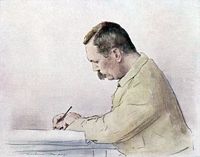Arthur Conan Doyle: Difference between revisions
Jump to navigation
Jump to search

imported>Caesar Schinas m (Bot: Update image code) |
imported>Hayford Peirce (added See also) |
||
| Line 3: | Line 3: | ||
}} | }} | ||
'''Sir Arthur Ignatius Conan Doyle''' (May 22, 1859 – July 7, 1930) was a [[United Kingdom|British]] author and physician. A prolific writer, his work included [[historical novel]]s, [[Science fiction|science fiction]], [[poetry]], plays, and non-fiction. He is, however, best known as the creator of the immortal [[Sherlock Holmes]], whose fictional exploits helped popularize the new genre of [[detective fiction]]. Despite his scientific training as a doctor, Conan Doyle would, in his later years, publicly espouse a fascination with the supernatural, developing a belief in [[spiritualism]] and going so far as to write a book called ''The Coming of the Fairies''. | '''Sir Arthur Ignatius Conan Doyle''' (May 22, 1859 – July 7, 1930) was a [[United Kingdom|British]] author and physician. A prolific writer, his work included [[historical novel]]s, [[Science fiction|science fiction]], [[poetry]], plays, and non-fiction. He is, however, best known as the creator of the immortal [[Sherlock Holmes]], whose fictional exploits helped popularize the new genre of [[detective fiction]]. Despite his scientific training as a doctor, Conan Doyle would, in his later years, publicly espouse a fascination with the supernatural, developing a belief in [[spiritualism]] and going so far as to write a book called ''The Coming of the Fairies''. | ||
==See also== | |||
*[[Crime fiction/Catalogs]] | |||
Revision as of 12:22, 11 October 2009
Sir Arthur Ignatius Conan Doyle (May 22, 1859 – July 7, 1930) was a British author and physician. A prolific writer, his work included historical novels, science fiction, poetry, plays, and non-fiction. He is, however, best known as the creator of the immortal Sherlock Holmes, whose fictional exploits helped popularize the new genre of detective fiction. Despite his scientific training as a doctor, Conan Doyle would, in his later years, publicly espouse a fascination with the supernatural, developing a belief in spiritualism and going so far as to write a book called The Coming of the Fairies.
